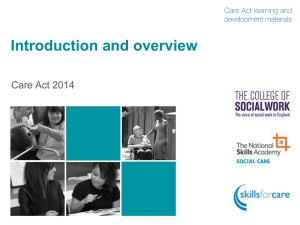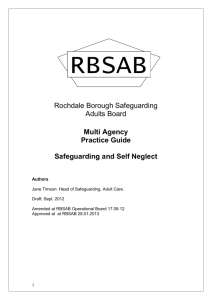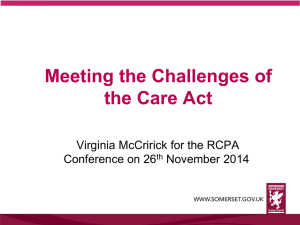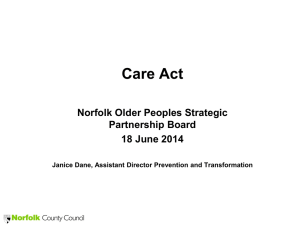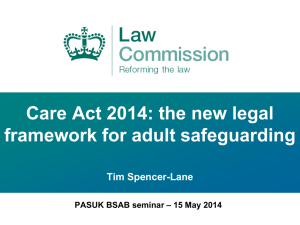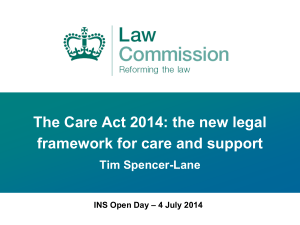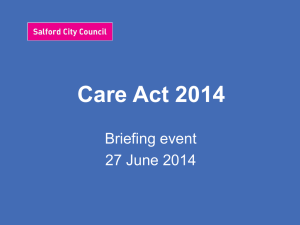Overview of Care Act and Richmond Council Programme
advertisement
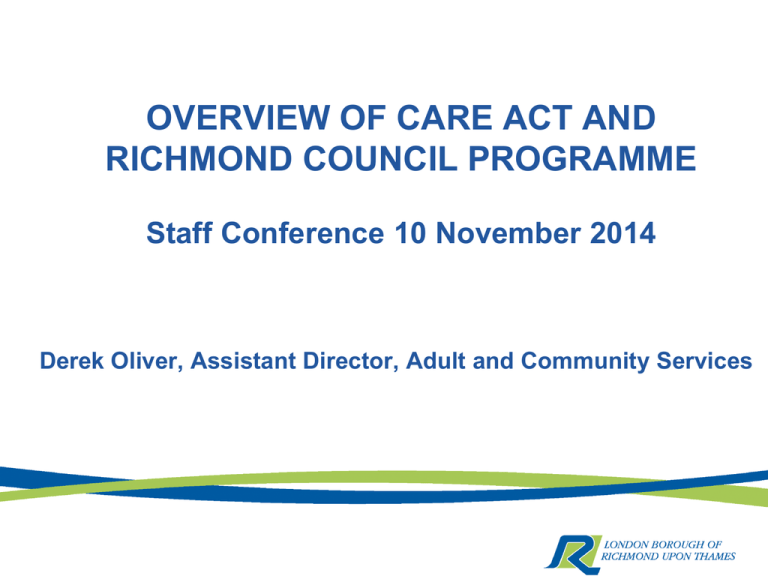
OVERVIEW OF CARE ACT AND RICHMOND COUNCIL PROGRAMME Staff Conference 10 November 2014 Derek Oliver, Assistant Director, Adult and Community Services Structure of Presentation Provide details about the key changes Council`s programme and readiness Aims of the Care Act Provide clearer and fairer offer Promote people’s wellbeing Enable people to prevent and delay the need for care and support, Enable Carers to maintain their caring role Put people in control of their lives so they can pursue opportunities to realise their potential 3 Legal framework of Care Act Underpinning principle Wellbeing General responsibilities and key duties Prevention Information, advice and advocacy Integration, partnerships and transitions Diversity of provision and market oversight Key processes Assessment and eligibility Charging and financial assessment Care and support planning Personal budgets and direct payments Review Safeguarding 4 The wellbeing principle Personal dignity Physical and mental health and emotional wellbeing Protection from abuse and neglect Control over day-to-day life Participation in work, education, training or recreation Social and economic wellbeing Domestic, family and personal Suitability of living accommodation Individual’s contribution to society 5 New responsibilities for local authorities towards all local people Prevent, reduce or delay peoples’ needs for care and support Provide information and advice, including independent financial advice Collaborate and cooperate with other public authorities, including integration with NHS and other services Promote diversity and quality in the market of care providers Ensure that no one is left without care if their service closes because of business failure 6 New duties for local authorities Duty to meet carers’ eligible needs and prepare a support plan Duty to arrange independent advocacy if person unable to participate in or understand the care and support system New statutory framework for protecting adults from neglect and abuse. Duty to investigate suspected abuse or neglect, past or present, experienced by adults still living and deceased Duty to assess young people and their carers in advance of transition from children’s to adult services, where likely to need care and support as an adult 7 New duties in relation to safeguarding Statutory guidance replaces ‘No Secrets’ guidance To make enquiries, or cause others to do so Set up a Safeguarding Adults Board (SAB), with core membership from the local authority, the Police and the NHS Arrange, where appropriate, for an independent advocate to represent and support an adult who is the subject of a safeguarding enquiry or Safeguarding Adult Review Core partners to co-operate in order to protect adults experiencing or at risk of abuse or neglect Safeguarding Adult Boards (SAB) must Publish a strategic plan for each financial year that sets out how it will meet its main objective. Publish an annual report detailing what the SAB has done during the year to achieve its objective and what it and each member has done to implement its strategy. Decide when a Safeguarding Adults Review is necessary, arrange for its conduct and implement the findings. (The purpose of an SAR must be to learn lessons and improve practice and interagency working.) The SAB can require information from an organisation or individual relevant to its functions Assessment and Eligibility process Assessment • What are the needs and outcomes the person wants to achieve? Eligibility determination Financial Assessment • Are the person’s needs eligible? • Charges based on charging policy and subject to limits Deferred payment agreement • Must be offered to anyone who meets the criteria 1 0 Care and Support Planning process Care and support planning should put people in control of care Person must be actively involved and influential throughout the planning process Independent advocates must be instructed early in planning process for people with substantial difficulty and no other means of accessing support to facilitate involvement 1 1 Personal Budgets, Direct Payments and Review The personal budget and direct payments must be sufficient to meet eligible care and support needs The overall cost must be broken down into: the amount the person must pay the amount the authority will pay The review process should be: person-centred outcomes focused accessible proportionate to the needs to be met 1 2 Implications for people needing care and support Better access to information and advice, preventative services, and assessment of need An entitlement to care and support A cap on care expenditure which an individual is liable for comes into effect from April 2016 A common system across the country: Continuity of care Fair Access to Care Services (FACS) replaced by a national eligibility threshold 1 3 Vision Enabling a full life We aim to offer the right amount of care and support at the right time and place. We are committed to supporting citizens in their journey and enabling them to be in control of their wellbeing. Richmond`s programme work streams and lead officers Programme Sponsor with overall responsibility: Derek Oliver Programme Manager for delivery: Gill Ford Community Offer Lynn Wild Di Manning Market Shaping Amanda McGlennon Prevention Janet Cole Anna Raleigh Safeguarding Jon Norris Social care charging Jeremy DeSouza Andrew Rhodes Key deliverables (1) Adult Prevention Strategy Enhanced provision of information and advice (including financial advice) Reviewing Safeguarding Board Reviewing safeguarding interventions - Making Safeguarding Personal Reviewing and streamlining how adult social care is delivered to service users and carers Implementing new eligibility framework for users and carers Devising fair and equitable system for allocating Personal Budgets Key deliverables (2) Enhanced advocacy offer Changed carers offer to ensure more carers are reached and duties fully met New charging policy Wider availability of deferred payments Introduction of Care Accounts to track progress towards Care Cap in 2016 Market Position Statement Readiness check Programme and implementation plan in place Local health and social care systems leadership awareness and engagement Progress in forecasting future demand and implications Concerns regarding cost of reforms, immediate and on-going Workforce IT systems Unknown risks Summary Significant modernising legislation incorporating : New duties for local authorities New rights for service users and carers Aims to make care and support clearer and fairer and put wellbeing at centre of decisions and extend personalisation Local authorities have new responsibilities to all local people, including self funders Significant changes to the way that people will access the care and support system 1 9
